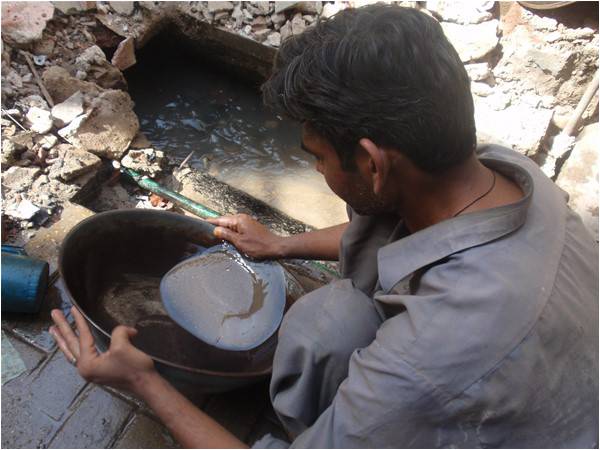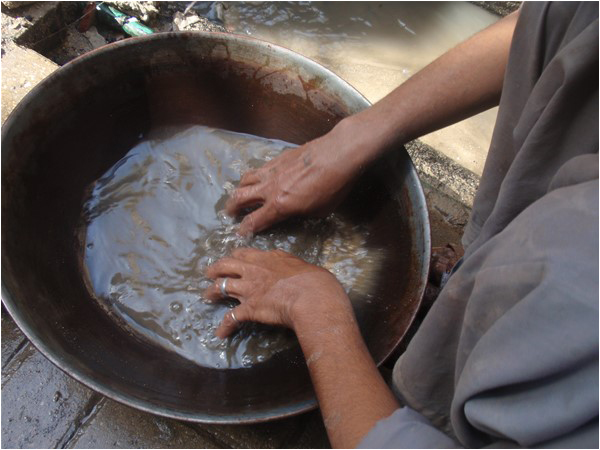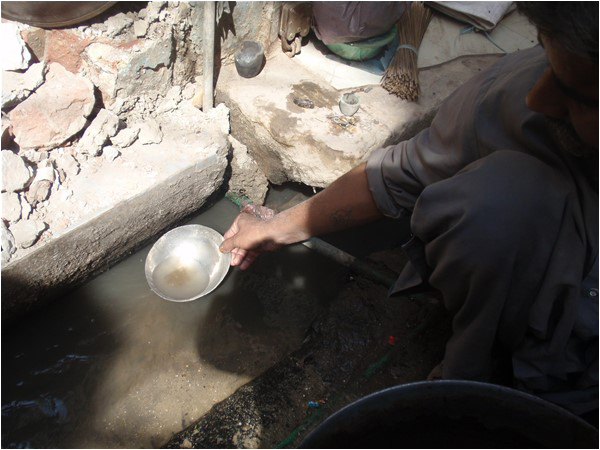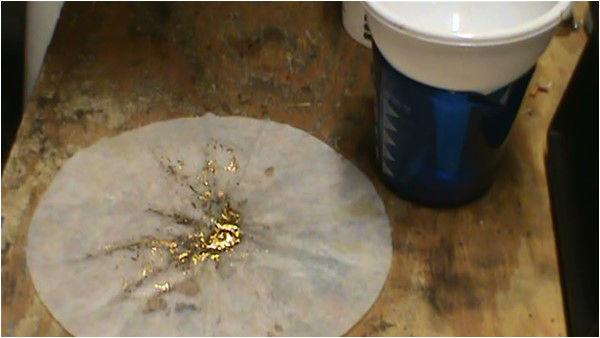
People looking to buy gold can expect to pay exorbitant amounts due to its skyrocketing market price. And so, people hailing from the middle and lower-middle classes often buy silver jewellery with a gold polish to compete with the well-heeled. During weddings, some people ask their jewelers to make a big set out of 20 grammes or a little more and to compensate for that expenditure, they cut down on other expenses like food, clothes and utensils.
But sweeper Roshan Lal is bit ‘lucky’ in this regard. He manages to accumulate this treasure for free. He finds gold particles in a drain at Sarrafa Bazaar – but it takes hard toil from dawn to dusk. All he has to do is to sit by the drain and sift through the muddy sewage water and strain it numerous times before only tiny stones are left in his metal bowl. He then scours through the contents of his bowl to pick out the miniscule particles, all of which are not actually gold, of course. It often takes hours of meticulous work before he finds actual gold particles. Roshan’s family has been part of this business for generations. His grandfather Darshan Lal and father Jawahar Lal also earned their livelihoods through this work.

Recalling the past while scouring through the metal bowl, Roshan says that he has been searching for gold since he was a child and this is the only work he is an expert at. “Goldsmiths prepare ornaments from gold, during which they cut the gold into pieces and thus tiny particles are left behind, which, at the end of the day, are swept into the drain along with the dirt in the shop,” he explains. “Therefore I start my work early in the morning and by the evening I manage to find 250 to 300 milligrammes of gold.”
Earlier there were many sweepers in this business but now most gold ornaments are ordered from Karachi and the jewellery business in Sukkur has reduced considerably. This has its impact on the gold-sweepers too.
Roshan says: “Now, only two or three of us are left in this business and everyone finds something [else] to provide bread and butter to their families.”

He explains that the work is difficult and it takes the better part of a person’s day to find a measly 250 to 300 milligrammes of gold. This is why most of the sweepers have left this work.
As he wraps up his own work-day he shows me what he has been able to collect: “I’ve found many pieces of gold-like metal and now I’ll go home and sift through this in a special bowl and add acid to the mix.”
The acid that Roshan uses is able to melt every metal except gold. He then has to heat these gold particles to melt them into a tiny ball, which is further refined with the addition of acid. “This is how I manage to get some gold after toiling all day,” he says. He usually earns between Rs.700 to Rs.1,000 per day.
He is quite aware that ever-rising inflation has badly affected the purchasing power of middle and lower-middle class people. “As far as I am concerned, I have six children and all of them are minors. And so, I alone have to take up the burden.” According to Roshan, his son Lachman is 11 years old, but he doesn’t want him to join his work. “I want him to get proper education and find some good job to rid the family of extreme poverty”, he hopes. Roshan says that one of his cousins is working as a supervisor in a private tobacco company. “Therefore I want my son to get a proper education and follow the footsteps of his uncle!”

Talking about his grandfather Darshan Lal and father Jawahar Lal, Roshan says that their time was good, because at that time most of the goldsmiths used to prepare gold ornaments at their shops. Dozens of sweepers used to sift through the drains of Sarrafa Bazar and find enough gold to make ends meet.
“Moreover, in the time of my grandfather and father, the sweepers with mutual consent had specified particular areas for particular sweepers, due to which no one would sift through the drains allotted to the others. Despite this, all the sweepers used to find enough gold at the end of the day and thus earned well. Today, there are only two or three sweepers including myself, who are left in this business. Sometimes I find nothing and sometimes too little.”
He then continues with a wide grin: “But yes, there are some days when I’m able to earn well!”
The President of the Sarrafa Association of Sukkur, Jawed Memon, tells me: “In Karachi and other cities sweepers have to pay a certain amount to the shopkeepers for sifting through the drains for gold particles near their shops, but in Sukkur they are not charged a single penny and we pay them a good amount for the gold that they find after hard toil.”
Memon further says that due to these sweepers, who sift through the drains all the day, the drainage system in Sarrafa Bazaar seldom chokes up.
The sweepers have to take all the sewage out before starting their lengthy process of finding gold.
Sarfaraz Memon is a freelance journalist and can be reached at memonfraz@gmail.com
But sweeper Roshan Lal is bit ‘lucky’ in this regard. He manages to accumulate this treasure for free. He finds gold particles in a drain at Sarrafa Bazaar – but it takes hard toil from dawn to dusk. All he has to do is to sit by the drain and sift through the muddy sewage water and strain it numerous times before only tiny stones are left in his metal bowl. He then scours through the contents of his bowl to pick out the miniscule particles, all of which are not actually gold, of course. It often takes hours of meticulous work before he finds actual gold particles. Roshan’s family has been part of this business for generations. His grandfather Darshan Lal and father Jawahar Lal also earned their livelihoods through this work.

Recalling the past while scouring through the metal bowl, Roshan says that he has been searching for gold since he was a child and this is the only work he is an expert at. “Goldsmiths prepare ornaments from gold, during which they cut the gold into pieces and thus tiny particles are left behind, which, at the end of the day, are swept into the drain along with the dirt in the shop,” he explains. “Therefore I start my work early in the morning and by the evening I manage to find 250 to 300 milligrammes of gold.”
Earlier there were many sweepers in this business but now most gold ornaments are ordered from Karachi and the jewellery business in Sukkur has reduced considerably. This has its impact on the gold-sweepers too.
Roshan says: “Now, only two or three of us are left in this business and everyone finds something [else] to provide bread and butter to their families.”

He explains that the work is difficult and it takes the better part of a person’s day to find a measly 250 to 300 milligrammes of gold. This is why most of the sweepers have left this work.
As he wraps up his own work-day he shows me what he has been able to collect: “I’ve found many pieces of gold-like metal and now I’ll go home and sift through this in a special bowl and add acid to the mix.”
The acid that Roshan uses is able to melt every metal except gold. He then has to heat these gold particles to melt them into a tiny ball, which is further refined with the addition of acid. “This is how I manage to get some gold after toiling all day,” he says. He usually earns between Rs.700 to Rs.1,000 per day.
He is quite aware that ever-rising inflation has badly affected the purchasing power of middle and lower-middle class people. “As far as I am concerned, I have six children and all of them are minors. And so, I alone have to take up the burden.” According to Roshan, his son Lachman is 11 years old, but he doesn’t want him to join his work. “I want him to get proper education and find some good job to rid the family of extreme poverty”, he hopes. Roshan says that one of his cousins is working as a supervisor in a private tobacco company. “Therefore I want my son to get a proper education and follow the footsteps of his uncle!”

Talking about his grandfather Darshan Lal and father Jawahar Lal, Roshan says that their time was good, because at that time most of the goldsmiths used to prepare gold ornaments at their shops. Dozens of sweepers used to sift through the drains of Sarrafa Bazar and find enough gold to make ends meet.
“Moreover, in the time of my grandfather and father, the sweepers with mutual consent had specified particular areas for particular sweepers, due to which no one would sift through the drains allotted to the others. Despite this, all the sweepers used to find enough gold at the end of the day and thus earned well. Today, there are only two or three sweepers including myself, who are left in this business. Sometimes I find nothing and sometimes too little.”
He then continues with a wide grin: “But yes, there are some days when I’m able to earn well!”
The President of the Sarrafa Association of Sukkur, Jawed Memon, tells me: “In Karachi and other cities sweepers have to pay a certain amount to the shopkeepers for sifting through the drains for gold particles near their shops, but in Sukkur they are not charged a single penny and we pay them a good amount for the gold that they find after hard toil.”
Memon further says that due to these sweepers, who sift through the drains all the day, the drainage system in Sarrafa Bazaar seldom chokes up.
The sweepers have to take all the sewage out before starting their lengthy process of finding gold.
Sarfaraz Memon is a freelance journalist and can be reached at memonfraz@gmail.com

